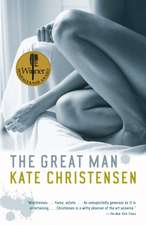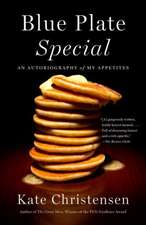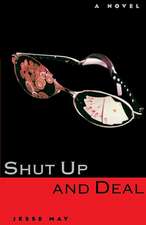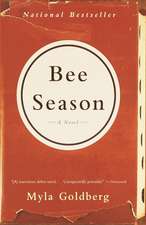The Astral
Autor Kate Christensenen Limba Engleză Paperback – 31 mai 2012
Preț: 86.57 lei
Nou
Puncte Express: 130
Preț estimativ în valută:
16.57€ • 17.34$ • 13.79£
16.57€ • 17.34$ • 13.79£
Carte disponibilă
Livrare economică 08-22 martie
Preluare comenzi: 021 569.72.76
Specificații
ISBN-13: 9780307473356
ISBN-10: 030747335X
Pagini: 320
Dimensiuni: 133 x 203 x 18 mm
Greutate: 0.24 kg
Editura: Anchor Books
ISBN-10: 030747335X
Pagini: 320
Dimensiuni: 133 x 203 x 18 mm
Greutate: 0.24 kg
Editura: Anchor Books
Notă biografică
Kate Christensen is the author of five previous novels, most recently Trouble. The Great Man won the 2008 PEN/Faulkner Award for Fiction. She has written reviews and essays for numerous publications, most recently the New York Times Book Review, Bookforum, Tin House, Elle, and Open City. She lives in New York City.
Extras
Chapter One
Toxic water streamed with gold like the belly of a turning fish: sunset over Newtown Creek. Tattered pinkish-black clouds blew overhead in the March wind. The water below me rippled with tendons and cowlicks. Just across the brief waterway were the low mute banks of Hunters Point, church spire, low-slung old warehouses. An empty barge made its way down the creek toward the East River and the long glittering skyscrapery isle. I stood behind the chain-link fence the city had slapped up to keep the likes of me from jumping in.
I was hungry and in need of a bath and a drink. At my back thronged the dark ghosts of Greenpoint, feeding silently off the underwater lake of spilled oil that lay under it all, the polyfluorocarbons from the industrial warehouses. I had named this place the End of the World years ago, when it was an even more polluted, hopeless wasteland, but it still fit.
As I stood staring out through the webbing of fence, my mind cast itself through the rivulets of my own lost verse. I netted little flashes of lines and phrases I’d been reworking, “Held spellbound, your mollusk voice / Quietly swathing my cochlea / In tentacles of damask cloth” and “Slow-weathered verdigris of our once bronzed thighs,” but they sounded dead to me now. All I could really hear was Luz, Luz, Luz like the feeble pulsing signals of a dying heart. Heartache was a physical thing, a pain in my chest, a sort of recoiling tension with an ache like a bruise. There was a withheld quality to my breathing lately, as if I had been sucker punched and was waiting to get my wind back, but no wind came. I could remember whole published poems, but if these new, destroyed verses still existed in my brain, they fled from the webbing of my memory like darting schools of tiny fish, scooching away the instant before capture.
I turned away from this butt end of waterfront warehouses and walked back the way I’d come, along Manhattan Avenue, past the flophouse where I lived now, bare mattresses piled in the front window. I passed junk shops full of old radios, used dolls, and cowboy shirts, Goldsholle and Garfinkel Inc., Mexican bodegas, liquor stores, the abandoned hulk of JK Restaurant Supply with its twisted metal grate, small markets with root vegetables in boxes along the sidewalk, butchers’ shops festooned with loops of kielbasy. I went through the intersection at Greenpoint Avenue, the dingy McDonald’s, defeated Starbucks, opposing Arab newsstands, and on to the old Associated Supermarket with its sexy Polish girls pouting at nothing as they rang up your groceries. The outdoor clock at the Smolenski Funeral Home was permanently stopped at 6:30, both hands pointing straight down to hell.
I hung a right off Manhattan Avenue and aimed myself toward the glowing neon sign in the window of Marlene’s, one of the last local old-man bars. Was I an old man yet, at fifty-seven? I’d been going there for years. The place had rusty tin ceilings, original wainscoting, two-dollar drafts in small, icy mugs, and moose antlers. The one concession to the new millennium was a flat-screen the size of a small car.
“Hello there, Harry,” said George as I came in. The most deadpan voice I have ever heard. If he has any feelings that cause him to lie awake wracked with turmoil in the small hours of the morning, he’s not telling. What he’ll do is pour you a grudging whiskey finger for three bucks. Never a double; that’s not the way they do things at Marlene’s.
George has a pocked face the color of gray chalk, a thin colorless wavelet of hair pasted to his scalp, and small protruding eyes. He has a day job at the Acme Smoked Fish warehouse on Gem Street, but he moonlights, so to speak, at Marlene’s, for the social life it affords him; otherwise he would have none, he once confided in me with endearing frankness. Marlene is his sister.
I parked myself on a stool midway down the empty bar. George handed me a whiskey and I swallowed it whole and felt a little warmer. My mother was Irish, my father English, but whiskey unites my opposing factions; I like the smokier, pricier, older single malts, but the cheap blended brands do the job just the same.
“How are things, George?” I asked as he set my second whiskey before me.
“Never better,” he said. “Yourself, Harry?”
I looked him in the eye. “Never better.”
Marlene’s opens every day before noon and closes in the very early morning and is almost always populated by its regulars, most notably several local women who park themselves in a row at the bar and settle in for the duration like birds on a wire, smoking and kibitzing and getting shitfaced. But here George and I were tonight with the place to ourselves, separated by a barrier of scuffed wood, he serving, me drinking, a scenario that plays itself out everywhere, all the time, two lonely men doing some manner of business together, not quite making eye contact.
“Couldn’t find the remote the other night,” said George. “Looked for it everywhere, all over my apartment. High and low. Even tried the freezer.”
“What were you watching?”
“One of my programs,” he said. “The one with the doctors. So I’m looking for it and the phone rings. I go to pick up the phone and press the remote and say, Hello? So there was the remote. Then I couldn’t find the phone. Finally found it on top of the fridge where I left it when I was looking for the remote. Sometimes it seems like the world is playing a joke.”
“And it’s not always funny,” I said. “By the way, Luz threw me out.”
“What? She did? When was this?” He looked truly shocked. Long-term marriages apparently appear as permanent to others as geographical formations; when one dissolves, it’s as if Fuji or Fiji had disappeared overnight.
“Not too long ago,” I said.
“Well,” he said, “that’s tough. That’s just tough. So where you living now?”
“I’m renting a room in the hotel down by Newtown Creek.”
He cocked his head and set another whiskey in front of me. “This one’s on me.”
“Thanks, George.” I lifted my glass. “‘Blindly we lurch through life like crones / Plying high heels on the cobblestones.’” That was from one of my old poems, the ones that were as accessible to my memory as my own name.
“Sure,” he said. He was used to my delusions that I was the neighborhood bard. He folded his arms and looked down at the scuffed surface of the bar. “Those cobblestone bricks down on West Street are made of wood, not clay, did you know that?”
“Near Noble Street,” I said. “You can see the tree rings in them if you look closely. I wrote a poem about it. ‘Frets, concentric, fraught with letters from old clouds.’”
“I was afraid they’d catch fire when the Terminal Market went up a few years back.”
“Me too,” I said. “I kept thinking, if the wind were blowing inland, the whole neighborhood would catch. It would have happened so fast--a piece of burning ash falling just so.”
I had watched the grand old warehouse burn with Luz beside me, both of our faces pressed to the same windowpane.
George shot me a look. “Right, you live in the Astral,” he said. “That must have been scary.”
“Used to.”
“That’s right,” said George, the tip of his tongue swiping at his upper lip. “Maybe you’re better off out of that place. I hear there’s mushrooms growing in the bathrooms and bedbugs living in the furniture. I hear the super has a photo studio in the basement where he takes pictures of young Asian girls.” He said this last without a whiff of salaciousness. George seems to have excised the sexual part of his brain as a way of keeping his life simple. Smart man.
The door opened, and Karina entered and charged down the bar toward me. “Hi, Dad!” she said. “I thought you’d be here. I wish you would get a cell phone.”
“Why do I need one?” I asked as she kissed me on the cheek. “You know where to find me.”
“I’ll have a draft, please,” she told George, then said to me, “I’ve been worried about you. How are you?”
“Never better,” I said hopefully, but I already knew she wasn’t having any of it, and anyway, I was flattered by her concern. My daughter had just turned twenty-five, but unlike other girls her age, she was totally uninterested in anything beyond a narrow range of severely ascetic passions, the most intense of these being Dumpster diving, colloquially known as freeganism. She regularly foraged for and redistributed quantities of garbage, or rather “perfectly good food and clothing,” to “the poor,” of which I was now, come to think of it, one. In addition to trying to save the world from its proliferation of waste and to save the poor from deprivation, she has never been able to shake the notion that she’s solely responsible for the well-being of her family.
Karina’s coloring is like mine, pure English/Irish, reddish-haired, fair-skinned, blue-eyed, rather than her olive-skinned, black-haired, dark-eyed Mexican mother’s, but her face looks so much like Luz’s--oval shape, large eyes, blunt nose, a quiveringly focused expression like an alert animal’s--it pierced my heart just then to look at her.
“Come on,” she said. “Tell the truth.”
“The truth,” I told her as she took a swig of bitter foam, “is that life goes on, like it or not, till you croak.”
“Oh Dad,” she said without appearing to have heard me, “I wish you would come and live at my place. That hotel is a death trap. Guys knife each other in the hallway.”
“Thank you,” I said with a brief internal quailing. Had it come to this, that my own daughter thought I was incapable of taking care of myself? Of course it had; she had thought that since the day she was born, and she was right. “Thank you, Karina, but really, I’m all right.”
“I have that extra little room,” she said, bossy and insistent.
“When is the last time you heard from your brother?”
“Hector? He never calls me.”
“I haven’t been able to contact him for a while. The only number I have for him is some sort of public telephone, and no one seems to be willing to go and fetch him when I call. He’s always in some sort of meeting or working or asleep.”
“Why are you trying to call him? You never call me.”
“Because I’m worried about him, and I’m not worried about you.”
“You can’t call just to say hi? Look, I came all the way over to Greenpoint to track you down. And Hector can’t even bother to come to the friggin’ phone.”
“I’m worried about him,” I repeated, “and I’m not worried about you.”
She laughed. “Okay, okay. But come on! He’s probably just busy.” She took another sip of beer. “Dad, please come and stay at my place. Please. You’re living with junkies and vagrants and lunatics. It’s dangerous.”
“I like it there,” I said. “It suits my purposes for now. I don’t want to move all the way to Crown Heights. That’s not my neighborhood. I don’t know anyone there, and it’s too far from Marlene’s, but thanks for the offer.”
“Then please get a cell phone. I have a heap of cast-off phones in a drawer, so all you need is a cheap monthly plan. Or pay as you go.”
“I don’t have any money,” I said. “Have you seen your mother lately?”
“I just came from there. She needed help getting rid of some things.”
“My things,” I said without inflection.
“Well, she says you don’t want them.”
“I want them,” I said, “to stay right where they are, waiting for me to live among them again.”
This put an end to our conversation for a moment. Behind me on the enormous flat-screen, a coiffed Latina in a blue jacket looked directly into the camera and with plush red lips intoned the goings-on of today’s world with cool, sultry authority. She reminded me of Luz. But everything reminded me of Luz right now, even the moose antlers above the bar. They made me think of our twentieth-anniversary trip; there had been moose antlers over our bed in the Adirondacks cabin we’d rented for a week. Luz had asked me to take them down and put them in a closet, or better yet, outside where they belonged. They were disgusting, she said; they were cruel. That I hadn’t done so, on the grounds that it was not my place to redecorate property belonging to others, was ranked thereafter in her hypothetical marital black book as one of my offenses. At least, I had always assumed it was hypothetical. Maybe she had written it all down somewhere. If so, I wondered what she would do with her compendium now that it was all over. Sell it at a stoop sale? Publish it as an antimarriage manifesto?
“Oh, well,” I said, “never mind about that. Will you come with me to visit Hector tomorrow?”
Karina lifted up her glass and looked into her beer as if it were piss, then set it down again. “I have a lot to do tomorrow.”
“Come with me,” I said. “The garbage will wait.”
“It’s not that. I have a deadline. I’m writing an article for an online magazine. It’s going to take all day because I spent this afternoon tracking my parents down and making sure they were all right.”
I said before I could stop myself, “So your mother is all right.”
“Of course she is,” said my daughter. “She’d be all right in a nuclear war. But underneath, you know.”
“I know,” I said. I was too sad to say any more.
George had moved down to the far end of the bar and was concentrating on the TV news, or seeming to, while he busied himself with a pinkie fingertip, pulling wax from his ear. I motioned to him, caught his eye, pointed to my whiskey glass. He nodded and made his way down the bar with the bottle.
“Dad, I think this whole thing is horrible,” said Karina. “I’m not taking sides, I swear, I love you both, and it’s none of my business. But is it true you’re involved with Marion? No, don’t tell me. I don’t want to know.”
“Is that what your mother told you?”
“Well, it’s classic. Men usually have affairs with the women they’re closest to. Their female friends, their wives’ sisters or best friends, their co-workers, their friends’ wives . . .”
To mask my horror that Luz would tell our daughter this, I grinned at Karina. “How do you know so much about men’s extramarital affairs? You’re a lesbian. And you’re not married.”
From the Hardcover edition.
Toxic water streamed with gold like the belly of a turning fish: sunset over Newtown Creek. Tattered pinkish-black clouds blew overhead in the March wind. The water below me rippled with tendons and cowlicks. Just across the brief waterway were the low mute banks of Hunters Point, church spire, low-slung old warehouses. An empty barge made its way down the creek toward the East River and the long glittering skyscrapery isle. I stood behind the chain-link fence the city had slapped up to keep the likes of me from jumping in.
I was hungry and in need of a bath and a drink. At my back thronged the dark ghosts of Greenpoint, feeding silently off the underwater lake of spilled oil that lay under it all, the polyfluorocarbons from the industrial warehouses. I had named this place the End of the World years ago, when it was an even more polluted, hopeless wasteland, but it still fit.
As I stood staring out through the webbing of fence, my mind cast itself through the rivulets of my own lost verse. I netted little flashes of lines and phrases I’d been reworking, “Held spellbound, your mollusk voice / Quietly swathing my cochlea / In tentacles of damask cloth” and “Slow-weathered verdigris of our once bronzed thighs,” but they sounded dead to me now. All I could really hear was Luz, Luz, Luz like the feeble pulsing signals of a dying heart. Heartache was a physical thing, a pain in my chest, a sort of recoiling tension with an ache like a bruise. There was a withheld quality to my breathing lately, as if I had been sucker punched and was waiting to get my wind back, but no wind came. I could remember whole published poems, but if these new, destroyed verses still existed in my brain, they fled from the webbing of my memory like darting schools of tiny fish, scooching away the instant before capture.
I turned away from this butt end of waterfront warehouses and walked back the way I’d come, along Manhattan Avenue, past the flophouse where I lived now, bare mattresses piled in the front window. I passed junk shops full of old radios, used dolls, and cowboy shirts, Goldsholle and Garfinkel Inc., Mexican bodegas, liquor stores, the abandoned hulk of JK Restaurant Supply with its twisted metal grate, small markets with root vegetables in boxes along the sidewalk, butchers’ shops festooned with loops of kielbasy. I went through the intersection at Greenpoint Avenue, the dingy McDonald’s, defeated Starbucks, opposing Arab newsstands, and on to the old Associated Supermarket with its sexy Polish girls pouting at nothing as they rang up your groceries. The outdoor clock at the Smolenski Funeral Home was permanently stopped at 6:30, both hands pointing straight down to hell.
I hung a right off Manhattan Avenue and aimed myself toward the glowing neon sign in the window of Marlene’s, one of the last local old-man bars. Was I an old man yet, at fifty-seven? I’d been going there for years. The place had rusty tin ceilings, original wainscoting, two-dollar drafts in small, icy mugs, and moose antlers. The one concession to the new millennium was a flat-screen the size of a small car.
“Hello there, Harry,” said George as I came in. The most deadpan voice I have ever heard. If he has any feelings that cause him to lie awake wracked with turmoil in the small hours of the morning, he’s not telling. What he’ll do is pour you a grudging whiskey finger for three bucks. Never a double; that’s not the way they do things at Marlene’s.
George has a pocked face the color of gray chalk, a thin colorless wavelet of hair pasted to his scalp, and small protruding eyes. He has a day job at the Acme Smoked Fish warehouse on Gem Street, but he moonlights, so to speak, at Marlene’s, for the social life it affords him; otherwise he would have none, he once confided in me with endearing frankness. Marlene is his sister.
I parked myself on a stool midway down the empty bar. George handed me a whiskey and I swallowed it whole and felt a little warmer. My mother was Irish, my father English, but whiskey unites my opposing factions; I like the smokier, pricier, older single malts, but the cheap blended brands do the job just the same.
“How are things, George?” I asked as he set my second whiskey before me.
“Never better,” he said. “Yourself, Harry?”
I looked him in the eye. “Never better.”
Marlene’s opens every day before noon and closes in the very early morning and is almost always populated by its regulars, most notably several local women who park themselves in a row at the bar and settle in for the duration like birds on a wire, smoking and kibitzing and getting shitfaced. But here George and I were tonight with the place to ourselves, separated by a barrier of scuffed wood, he serving, me drinking, a scenario that plays itself out everywhere, all the time, two lonely men doing some manner of business together, not quite making eye contact.
“Couldn’t find the remote the other night,” said George. “Looked for it everywhere, all over my apartment. High and low. Even tried the freezer.”
“What were you watching?”
“One of my programs,” he said. “The one with the doctors. So I’m looking for it and the phone rings. I go to pick up the phone and press the remote and say, Hello? So there was the remote. Then I couldn’t find the phone. Finally found it on top of the fridge where I left it when I was looking for the remote. Sometimes it seems like the world is playing a joke.”
“And it’s not always funny,” I said. “By the way, Luz threw me out.”
“What? She did? When was this?” He looked truly shocked. Long-term marriages apparently appear as permanent to others as geographical formations; when one dissolves, it’s as if Fuji or Fiji had disappeared overnight.
“Not too long ago,” I said.
“Well,” he said, “that’s tough. That’s just tough. So where you living now?”
“I’m renting a room in the hotel down by Newtown Creek.”
He cocked his head and set another whiskey in front of me. “This one’s on me.”
“Thanks, George.” I lifted my glass. “‘Blindly we lurch through life like crones / Plying high heels on the cobblestones.’” That was from one of my old poems, the ones that were as accessible to my memory as my own name.
“Sure,” he said. He was used to my delusions that I was the neighborhood bard. He folded his arms and looked down at the scuffed surface of the bar. “Those cobblestone bricks down on West Street are made of wood, not clay, did you know that?”
“Near Noble Street,” I said. “You can see the tree rings in them if you look closely. I wrote a poem about it. ‘Frets, concentric, fraught with letters from old clouds.’”
“I was afraid they’d catch fire when the Terminal Market went up a few years back.”
“Me too,” I said. “I kept thinking, if the wind were blowing inland, the whole neighborhood would catch. It would have happened so fast--a piece of burning ash falling just so.”
I had watched the grand old warehouse burn with Luz beside me, both of our faces pressed to the same windowpane.
George shot me a look. “Right, you live in the Astral,” he said. “That must have been scary.”
“Used to.”
“That’s right,” said George, the tip of his tongue swiping at his upper lip. “Maybe you’re better off out of that place. I hear there’s mushrooms growing in the bathrooms and bedbugs living in the furniture. I hear the super has a photo studio in the basement where he takes pictures of young Asian girls.” He said this last without a whiff of salaciousness. George seems to have excised the sexual part of his brain as a way of keeping his life simple. Smart man.
The door opened, and Karina entered and charged down the bar toward me. “Hi, Dad!” she said. “I thought you’d be here. I wish you would get a cell phone.”
“Why do I need one?” I asked as she kissed me on the cheek. “You know where to find me.”
“I’ll have a draft, please,” she told George, then said to me, “I’ve been worried about you. How are you?”
“Never better,” I said hopefully, but I already knew she wasn’t having any of it, and anyway, I was flattered by her concern. My daughter had just turned twenty-five, but unlike other girls her age, she was totally uninterested in anything beyond a narrow range of severely ascetic passions, the most intense of these being Dumpster diving, colloquially known as freeganism. She regularly foraged for and redistributed quantities of garbage, or rather “perfectly good food and clothing,” to “the poor,” of which I was now, come to think of it, one. In addition to trying to save the world from its proliferation of waste and to save the poor from deprivation, she has never been able to shake the notion that she’s solely responsible for the well-being of her family.
Karina’s coloring is like mine, pure English/Irish, reddish-haired, fair-skinned, blue-eyed, rather than her olive-skinned, black-haired, dark-eyed Mexican mother’s, but her face looks so much like Luz’s--oval shape, large eyes, blunt nose, a quiveringly focused expression like an alert animal’s--it pierced my heart just then to look at her.
“Come on,” she said. “Tell the truth.”
“The truth,” I told her as she took a swig of bitter foam, “is that life goes on, like it or not, till you croak.”
“Oh Dad,” she said without appearing to have heard me, “I wish you would come and live at my place. That hotel is a death trap. Guys knife each other in the hallway.”
“Thank you,” I said with a brief internal quailing. Had it come to this, that my own daughter thought I was incapable of taking care of myself? Of course it had; she had thought that since the day she was born, and she was right. “Thank you, Karina, but really, I’m all right.”
“I have that extra little room,” she said, bossy and insistent.
“When is the last time you heard from your brother?”
“Hector? He never calls me.”
“I haven’t been able to contact him for a while. The only number I have for him is some sort of public telephone, and no one seems to be willing to go and fetch him when I call. He’s always in some sort of meeting or working or asleep.”
“Why are you trying to call him? You never call me.”
“Because I’m worried about him, and I’m not worried about you.”
“You can’t call just to say hi? Look, I came all the way over to Greenpoint to track you down. And Hector can’t even bother to come to the friggin’ phone.”
“I’m worried about him,” I repeated, “and I’m not worried about you.”
She laughed. “Okay, okay. But come on! He’s probably just busy.” She took another sip of beer. “Dad, please come and stay at my place. Please. You’re living with junkies and vagrants and lunatics. It’s dangerous.”
“I like it there,” I said. “It suits my purposes for now. I don’t want to move all the way to Crown Heights. That’s not my neighborhood. I don’t know anyone there, and it’s too far from Marlene’s, but thanks for the offer.”
“Then please get a cell phone. I have a heap of cast-off phones in a drawer, so all you need is a cheap monthly plan. Or pay as you go.”
“I don’t have any money,” I said. “Have you seen your mother lately?”
“I just came from there. She needed help getting rid of some things.”
“My things,” I said without inflection.
“Well, she says you don’t want them.”
“I want them,” I said, “to stay right where they are, waiting for me to live among them again.”
This put an end to our conversation for a moment. Behind me on the enormous flat-screen, a coiffed Latina in a blue jacket looked directly into the camera and with plush red lips intoned the goings-on of today’s world with cool, sultry authority. She reminded me of Luz. But everything reminded me of Luz right now, even the moose antlers above the bar. They made me think of our twentieth-anniversary trip; there had been moose antlers over our bed in the Adirondacks cabin we’d rented for a week. Luz had asked me to take them down and put them in a closet, or better yet, outside where they belonged. They were disgusting, she said; they were cruel. That I hadn’t done so, on the grounds that it was not my place to redecorate property belonging to others, was ranked thereafter in her hypothetical marital black book as one of my offenses. At least, I had always assumed it was hypothetical. Maybe she had written it all down somewhere. If so, I wondered what she would do with her compendium now that it was all over. Sell it at a stoop sale? Publish it as an antimarriage manifesto?
“Oh, well,” I said, “never mind about that. Will you come with me to visit Hector tomorrow?”
Karina lifted up her glass and looked into her beer as if it were piss, then set it down again. “I have a lot to do tomorrow.”
“Come with me,” I said. “The garbage will wait.”
“It’s not that. I have a deadline. I’m writing an article for an online magazine. It’s going to take all day because I spent this afternoon tracking my parents down and making sure they were all right.”
I said before I could stop myself, “So your mother is all right.”
“Of course she is,” said my daughter. “She’d be all right in a nuclear war. But underneath, you know.”
“I know,” I said. I was too sad to say any more.
George had moved down to the far end of the bar and was concentrating on the TV news, or seeming to, while he busied himself with a pinkie fingertip, pulling wax from his ear. I motioned to him, caught his eye, pointed to my whiskey glass. He nodded and made his way down the bar with the bottle.
“Dad, I think this whole thing is horrible,” said Karina. “I’m not taking sides, I swear, I love you both, and it’s none of my business. But is it true you’re involved with Marion? No, don’t tell me. I don’t want to know.”
“Is that what your mother told you?”
“Well, it’s classic. Men usually have affairs with the women they’re closest to. Their female friends, their wives’ sisters or best friends, their co-workers, their friends’ wives . . .”
To mask my horror that Luz would tell our daughter this, I grinned at Karina. “How do you know so much about men’s extramarital affairs? You’re a lesbian. And you’re not married.”
From the Hardcover edition.
Recenzii
“Spectacular. . . . The Astral, artfully composed and emotionally tender, is evidence of true literary genius.” —The Miami Herald
“Impossible to put down. . . . Harry Quirk, living up to his own name, is a gem.” —The Oregonian
“The Astral is a work of art, a prose poem, and a finely told tale. . . . [A] tender, aching marvel of a book.” —The Huffington Post
“An ode to Brooklyn and broken marriages, endings and beginnings, and the spaces in between.” —The Boston Globe
“Christensen has somehow—again—created a captivatingly believable male narrator.” —The Washington Post
“An object lesson on the current realist novel. . . . The Astral is structured as a journey—a poet’s trip through an interior and exterior landscape—and Christensen manages each step with quiet deliberation.” —The New York Times Book Review
“[Christensen’s] characters’ ruminations on how the forces of love and deception work in tandem within a relationship are both searing and concise. . . . [She] is a forceful writer whose talent is all over the page. Her prose is visceral and poetic, like being bludgeoned with an exquisitely painted sledgehammer. She is a portrait artist, drawing in miniature, capturing the light within.” —San Francisco Chronicle
“A tart, compassionate story of marriage gone wrong.” —O, The Oprah Magazine
“[A] sharp perceptive novel. . . . Christensen’s The Astral is provoking and at times profoundly moving.” —Associated Press
“Ah, urban beauty: Christensen gets what’s funny about it, and also what’s disappointing. She’s a mischievous writer with a keen eye and ear for comedy, one who sets up precarious scenarios and then lets her characters hash things out.” —The New York Observer
“[This] novel, by turns funny sad, and wise, is glittering with insightful and lovely descriptions, and Harry is so far my favorite fictional character of 2011: he’s complicated, stubborn, smart, foolish, vulnerable, and—man oh man—does he feel real.” —Edan Lepucki, The Millions
“The tinder for this fire lies in moments most often small: Kate Christensen doesn’t fan the flames so much as reveal the embers as they spring to life. . . . Christensen’s prose is clean and her characters enthralling. . . . The novel is a wonderful investigation of the pitfalls that arise in even the longest of marriages” —The Denver Post
“Harry Quirk . . . [is] an unexpectedly irresistible hero in this delicious social satire.” —People
“The best exploration of a middle-aged man’s psyche since Bellow, all the more brilliant for having been written by a woman.” — Shelf Awareness (starred)
“Christensen is a gifted novelist who knows how to deliver the goods when it comes to ruefully funny, bittersweet character sketches.”—Christian Science Monitor
“Christensen perfectly embodies the voice of a male poet in crisis, Harry Quirk. . . . Readers will be sucked into extremely realistic familial dramas while Christensen perfectly captures her Brooklyn backdrop—from dive bars to hipsters drinking overpriced coffee in trendy cafes.” —BookPage
“As always in Christensen’s writing, like it or not, the gritty human truths she reveals apply to us all. . . . Christensen is formidable when it comes to psychological observation. What truly sets her writing apart, however, are the disturbing, touching, confounding discrepancies she articulates between inner experience and external behavior, the compassion she brings to bear in her analysis of the fraught, misguided ways in which people interact.” —The Brooklyn Rail
“Impossible to put down. . . . Harry Quirk, living up to his own name, is a gem.” —The Oregonian
“The Astral is a work of art, a prose poem, and a finely told tale. . . . [A] tender, aching marvel of a book.” —The Huffington Post
“An ode to Brooklyn and broken marriages, endings and beginnings, and the spaces in between.” —The Boston Globe
“Christensen has somehow—again—created a captivatingly believable male narrator.” —The Washington Post
“An object lesson on the current realist novel. . . . The Astral is structured as a journey—a poet’s trip through an interior and exterior landscape—and Christensen manages each step with quiet deliberation.” —The New York Times Book Review
“[Christensen’s] characters’ ruminations on how the forces of love and deception work in tandem within a relationship are both searing and concise. . . . [She] is a forceful writer whose talent is all over the page. Her prose is visceral and poetic, like being bludgeoned with an exquisitely painted sledgehammer. She is a portrait artist, drawing in miniature, capturing the light within.” —San Francisco Chronicle
“A tart, compassionate story of marriage gone wrong.” —O, The Oprah Magazine
“[A] sharp perceptive novel. . . . Christensen’s The Astral is provoking and at times profoundly moving.” —Associated Press
“Ah, urban beauty: Christensen gets what’s funny about it, and also what’s disappointing. She’s a mischievous writer with a keen eye and ear for comedy, one who sets up precarious scenarios and then lets her characters hash things out.” —The New York Observer
“[This] novel, by turns funny sad, and wise, is glittering with insightful and lovely descriptions, and Harry is so far my favorite fictional character of 2011: he’s complicated, stubborn, smart, foolish, vulnerable, and—man oh man—does he feel real.” —Edan Lepucki, The Millions
“The tinder for this fire lies in moments most often small: Kate Christensen doesn’t fan the flames so much as reveal the embers as they spring to life. . . . Christensen’s prose is clean and her characters enthralling. . . . The novel is a wonderful investigation of the pitfalls that arise in even the longest of marriages” —The Denver Post
“Harry Quirk . . . [is] an unexpectedly irresistible hero in this delicious social satire.” —People
“The best exploration of a middle-aged man’s psyche since Bellow, all the more brilliant for having been written by a woman.” — Shelf Awareness (starred)
“Christensen is a gifted novelist who knows how to deliver the goods when it comes to ruefully funny, bittersweet character sketches.”—Christian Science Monitor
“Christensen perfectly embodies the voice of a male poet in crisis, Harry Quirk. . . . Readers will be sucked into extremely realistic familial dramas while Christensen perfectly captures her Brooklyn backdrop—from dive bars to hipsters drinking overpriced coffee in trendy cafes.” —BookPage
“As always in Christensen’s writing, like it or not, the gritty human truths she reveals apply to us all. . . . Christensen is formidable when it comes to psychological observation. What truly sets her writing apart, however, are the disturbing, touching, confounding discrepancies she articulates between inner experience and external behavior, the compassion she brings to bear in her analysis of the fraught, misguided ways in which people interact.” —The Brooklyn Rail












